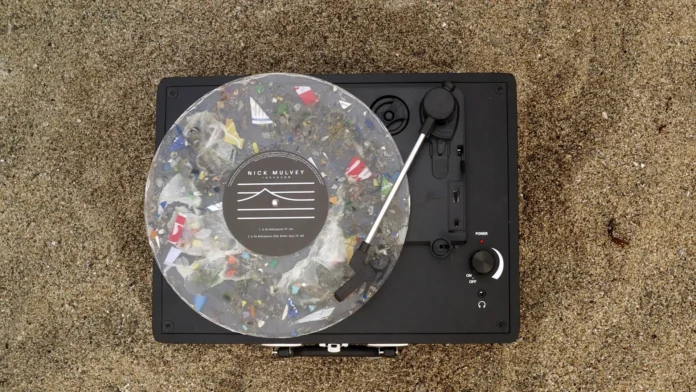“Sharp’s Brewery and Nick Mulvey, founding member of the band Portico Quartet, have recorded the track pressed onto this vinyl titled In The Anthropocene. Mulvey explained, “Lyrically, the song explores themes of responsibility and freedom in this time of urgent ecological and social crisis (and opportunity), AKA ‘The Anthropocene’.” Record designer Wesley Wolfe, most well-known for working with Pharrell Williams to make a bespoke clay audio disc, has pressed a collection of plastic from Cornish beaches. Even better, proceeds from both digital streams and sales of the limited-edition vinyl will go to Surfers Against Sewage to help protect British coastlines from all types of pollution, including plastic waste.
“Cornish culture is built around the ocean – whether that’s seafood, surfing or even our own Atlantic Ale,” said James Nicholls of Sharp’s Brewery. “Last year we helped the ocean enter the charts, under Keynvor – which means ‘ocean’ in the Cornish language. I’m excited to say that today we’re really turning the tables on the music industry by releasing In the Anthropocene with Nick Mulvey, by upcycling single-use plastic found on our beaches and turning it into playable ‘ocean vinyl.’”
“I’ve always loved the wildness of the Cornish coast and it feeds something deep in me every time I’m there,” said Mulvey. “My music is about knowing who – or what – we are, right at the core. Aliveness itself, conscious. These times of urgent global crisis are demanding we re-examine ourselves and the world and raise ourselves to match the earth, this wonder-organism from which we are not, and never have been, separate.”
“We are excited to be partnering with Sharp’s Brewery again to raise vital funds to protect our coastlines from plastic pollution and other environmental hazards,” added Hugo Tagholm, CEO of Surfers Against Sewage. “Keynvor, as a musical artist, and the new ‘ocean vinyl’, which uses plastic pollution and turns it into something positive, is a powerful way to help us raise money and continue to spread our message,” (Malby, 2019).
Overall, I think this is a cool development. Unlike recycled art I have critiqued in the past, it turns trash into something useful and valuable.
This experiment allows the artist’s message to manifest physically. Users putting on or displaying the vinyl have a tangible reminder of the music’s message. While working on my Arts Design Conjecture, I came across this article. Though single-use plastics are typically difficult to recycle, this artist figured out a way to press vinyl with incorporated plastic beach waste. I thought this could be an interesting addition to the Arts Design Conjecture piece because ODNR could incorporate pieces of trash into the vinyl from their parks, or use single-use plastics to produce the vinyl and reduce waste production. This design could have both a physical and emotional impact, the vinyl representative of both as a physical artifact and a tool to listen to music.
References
Malby, P. (2019, October 5). First ever playable vinyl made from single-use
plastic helps to give the ocean a voice. GQ. Retrieved September 16, 2024,
from https://www.gq-magazine.co.uk/music/article/
environmentally-friendly-vinyl-records
[Playable vinyl made of single-use plastic]. (n.d.). GQ.
https://www.gq-magazine.co.uk/music/article/
environmentally-friendly-vinyl-records




